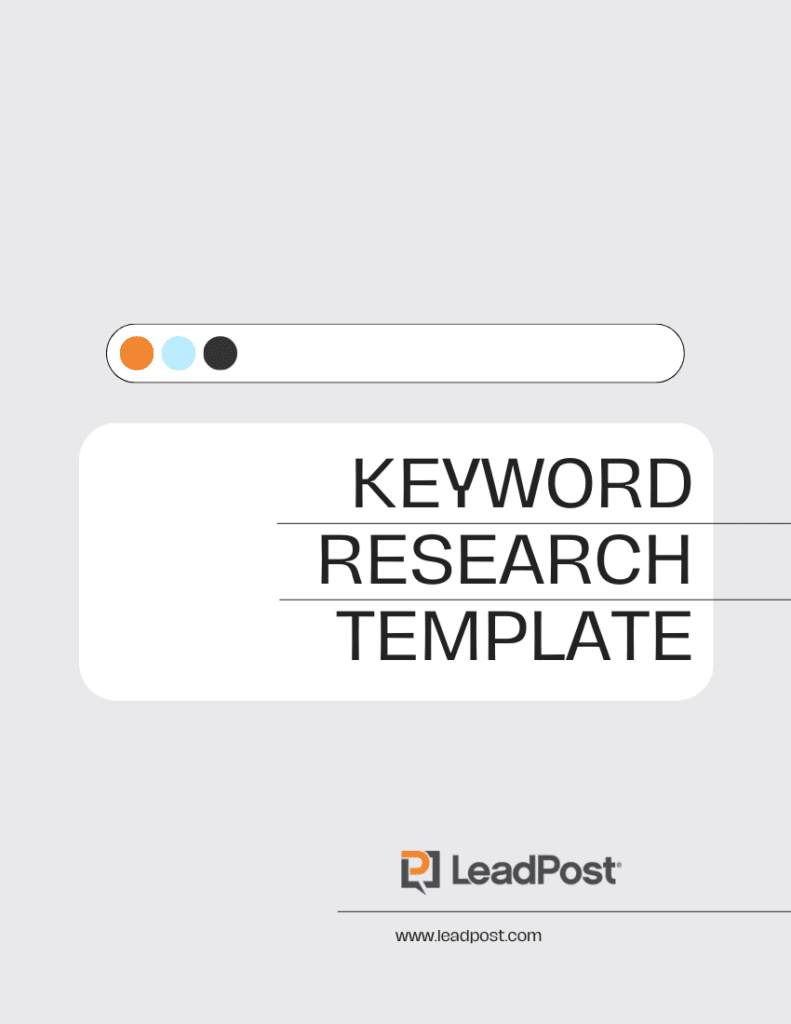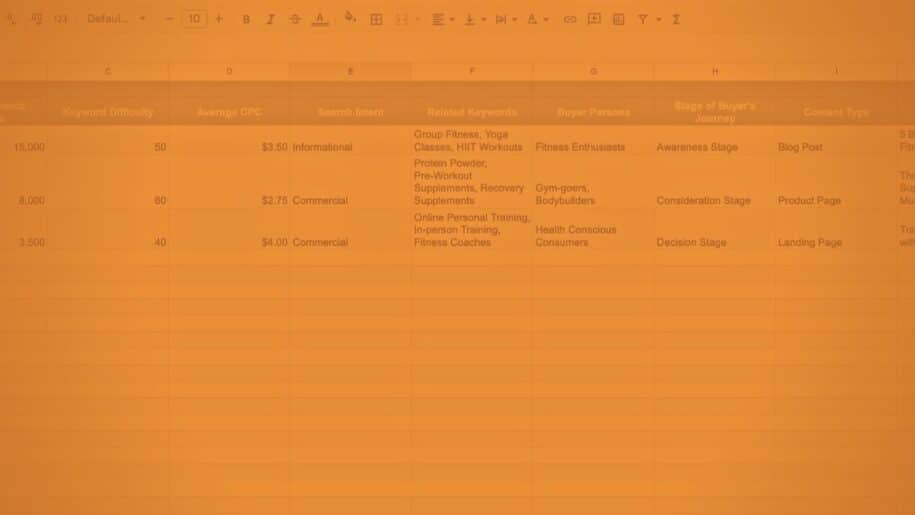Keywords are the backbone of any successful SEO strategy, as they help your content rank higher in search engine results pages (SERPs). One crucial component of effective keyword research is utilizing keyword research templates, which can significantly streamline your SEO efforts. In this blog post, we’ll share a free keyword research template.
We’ll also dig into what you need in a keyword research template, their benefits, and how to use them effectively.
Free Keyword Research Template

This keyword research template to help you determine where to focus your SEO efforts.
It’s a Google Sheet with multiple columns. Each column serves a unique purpose to help refine your content strategy.
For more information on each column, see the end of this article (or click here).
What is a Keyword Research Template?
A keyword research template is a document or spreadsheet used to organize, analyze, and manage keyword data for SEO campaigns. It helps:
- Keep track of target keywords
- Prioritize keywords
- Evaluate search volume
- Evaluate competition
- Ensure that you’re focusing on relevant keywords
- Identify content gaps
With the right template, you can easily prioritize your target keywords, identify new opportunities, and develop a comprehensive SEO strategy.
Benefits of Keyword Research Templates
There are many benefits to keyword research templates. Here are the most important ones:
- Saves time and effort. A well-designed template allows you to work more efficiently. By organizing and managing your keyword research data in one place you can easily see what needs to be done to improve your SEO. This eliminates the need to pull up your keyword research tool every time you need to assign an article.
- Streamlines the process. Templates ensure that you follow a consistent approach for all of your content. This makes it easier to compare data across different campaigns and draw meaningful insights from your research.
- Facilitates collaboration. Keyword research templates make it easy to share your findings with team members or clients. This enables better communication and ensures that everyone is on the same page when it comes to SEO strategy.
- Customization. Templates can be customized to meet your unique needs. You can add, remove or modify sections to better suit your specific SEO goals.
How to Choose a Keyword Research Template
You could easily make your own keyword research template, or adjust an existing template to meet your needs. When selecting a keyword research template, consider the following factors:
- Ease of use. Choose a template that is user-friendly and easy to navigate. It should be designed with a clear layout, making it simple to input and analyze data.
- Functionality. The template should have fields aligned with your SEO goals. This may include sections for search volume, keyword difficulty, cost-per-click (CPC), and more.
- Adaptability. Opt for a template that can be customized to suit your specific needs. This will allow you to tailor the template according to your needs and preferences. This one is pretty easy, since most templates are made with widely available tools like Google Sheets.
Tips for Using Keyword Research Templates
- Start with seed keywords. Begin your research by identifying seed keywords related to your niche or industry. These are the foundational terms that will help you generate a comprehensive list of long-tail keywords. Seed Keywords is a free tool that can help with that.
- Analyze search volume and competition. Use a keyword research tool like Ahrefs to gather data on search volume and competition for your target keywords.
- Categorize and prioritize. Organize your keywords into relevant categories and prioritize them based on their potential impact on your SEO strategy. This will help you focus your efforts on the most promising keywords.
- Track and measure performance. Regularly monitor the performance of your target keywords and update your template accordingly. This will enable you to make data-driven decisions and refine your SEO strategy over time.
What’s in the Free Keyword Research Template?
There are eleven fields in our free keyword research template. Here’s what each one means:
- Keyword. This is the primary search term or phrase you want to target.
- Monthly Search Volume. Keywords with higher volume can drive more traffic. But low search volume keywords are less competitive and easier to rank for. Aim for a mix.
- Keyword Difficulty. This is an estimated metric showing how hard it is to rank for a particular keyword. Different tools calculate this in different ways and it’s only an approximation. You can use Ahrefs to determine keyword difficulty.
- Average CPC (Cost per Click). The average cost an advertiser pays for each click in a PPC campaign indicates the value of a keyword. You can get this information from Google’s Keyword Planner or a tool like Ahrefs.
- Search Intent. You should write for humans first. So you need to know what they’re looking for when they search for your target terms. Understanding the user’s intent will help you create content that meets their needs.
- Related Keywords. This allows for better content optimization. It will improve your chances of ranking for multiple keywords.
- Buyer Persona. A representation of your ideal customer, including demographics, interests, and behavior. Create content that resonates with your target audience to improve engagement and conversion rates.
- Stage of Buyer’s Journey. It’s important to know where your visitors are in the purchase process. Tailor your content to guide potential customers through the sales funnel.
- Content Type. The right format improves the user experience and engagement. That helps with SEO and conversions.
- Content Topic. This helps ensure relevance to your target audience. It also makes it easier to develop pillar pages and topic clusters.
- Conversion Goal. Define clear goals (e.g., newsletter sign-ups, product sales, or lead generation) for all of your content. That way you can measure your success and optimize your strategy for better results.
